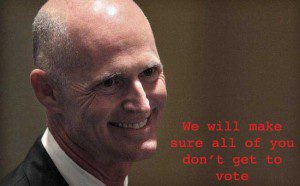The battle over the state’s controversial elections law reignited Monday, four days after a three-judge federal panel rejected a move to reduce the number of days of early voting in five counties.

Two state lawmakers joined a group of elected officials and civic leaders who unsuccessfully sought a meeting with Gov. Rick Scott to get him to roll back the blocked provision in the other 62 counties. Meanwhile, the elections supervisor of one of the five counties where the measure was barred by the federal court said state officials pushed local governments to try again to get a similar change approved.
The Legislature approved a measure in 2011 that would reduce the number of early voting days from 12 to eight while allowing — but not requiring — supervisors to make up for the difference by extending the voting hours on those days.
At the center of the battle is the intersection of that law with Florida’s obligations under the federal Voting Rights Act. Because of a history of racial and language discrimination, the five counties — Collier, Hardee, Hendry, Hillsborough and Monroe — have to get any changes in voting procedures approved by the U.S. Department of Justice or a three-judge panel.
The other 62 counties don’t face the same “preclearance” hurdle, though they still have to comply with the provisions of the Voting Rights Act meant to secure everyone’s right to cast ballots. Critics of the early-voting change say the federal court ruling proves the law should be void across the state.
“It’s slightly axiomatic that if you discriminate in five counties that there’s discrimination in the other 62,” said Sen. Arthenia Joyner, D-Tampa.
Joyner, who has filed a legal challenge to the Department of State’s order to the other 62 counties to go ahead with the law, was among a half-dozen leaders who tried to meet with Scott on Monday to discuss the ruling. They were turned away, though the governor’s legislative affairs director, Jon Costello, said Scott’s office would try to arrange a meeting before the November general elections.
Leon County Supervisor of Elections Ion Sancho, who was also in the group looking to meet with Scott, said the extra early voting days were needed to avoid particularly long lines on Election Day.
“The issue is that the state is playing dangerous games with Florida’s electoral infrastructure,” Sancho said. “We do not have a number of precincts necessary to accommodate all the voters on Election Day.”
Joyner and Dale Landry, a vice president of the state conference of the NAACP, suggested more legal challenges could be on the way to try to get the early voting change blocked in the other counties.
Shortly before the group tried to meet with Scott, Secretary of State Ken Detzner held a conference call with elections officials from the five counties, following up on a similar call Friday. A spokesman for Detzner said he was simply trying to lay out the options for the counties in the wake of the ruling.
The judges seemed to leave some room for a compromise, saying that they might be able to preclear going from 96 hours of voting spread over 14 days to 96 hours spread over eight days, assuming 12 hours was offered each day. The spokesman, Chris Cate, said the meetings were necessary because the state was technically filing for preclearance on behalf of the five counties.
“Our recommendation is for them to use as many hours as their county needs,” Cate said.
But Harry Sawyer, supervisor of elections in Monroe County, bristled at that description.
“They in no way left us with any other thought in our mind that there was any other choice but theirs,” he said.
Sawyer said the other four supervisors appear likely to go along with the state’s decision to try to get the eight-day, 12-hour solution precleared — but he won’t, saying he believes “it’s the days that count, and not the hours.”
By Brandon Larrabee


